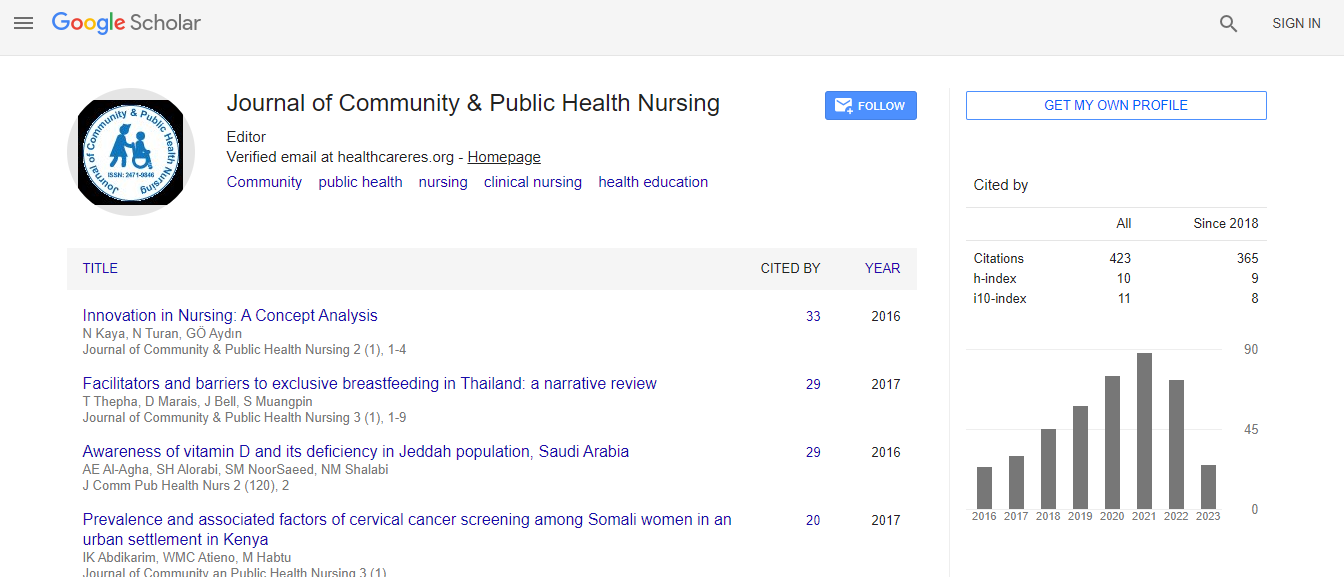Our Group organises 3000+ Global Conferenceseries Events every year across USA, Europe & Asia with support from 1000 more scientific Societies and Publishes 700+ Open Access Journals which contains over 50000 eminent personalities, reputed scientists as editorial board members.
Open Access Journals gaining more Readers and Citations
700 Journals and 15,000,000 Readers Each Journal is getting 25,000+ Readers
Google Scholar citation report
Citations : 739
Journal of Community & Public Health Nursing received 739 citations as per Google Scholar report
Journal of Community & Public Health Nursing peer review process verified at publons
Indexed In
- Google Scholar
- CiteFactor
- RefSeek
- Hamdard University
- EBSCO A-Z
- OCLC- WorldCat
- Publons
- Geneva Foundation for Medical Education and Research
- ICMJE
Useful Links
Recommended Journals
Related Subjects
Share This Page
Acute stress disorder, coping self-efficacy, and subsequent psychological distress among nurses amid covid-19
7th World Congress on Nursing Education & Research & 39th Global Nursing Care & Patient Safety
Ghada Mahmoud Shahrour
Jordan University of Science and Technology, Faculty of Nursing, Irbid, Jordan
ScientificTracks Abstracts: J Comm Pub Health Nurs
Abstract
Purpose: Health care professionals, particularly nurses, are considered a vulnerable group to experience acute stress disorder (ASD) and subsequent psychological distress amid COVID-19 pandemic. This study aims to establish the prevalence of acute stress disorder and predictors of psychological distress among Jordanian nurses. Methods: A quantitative, cross-sectional, descriptive and comparative design was used. Data were collected using a Web-based survey. A total of 448 Jordanian nurses (73% females) completed and returned the study questionnaire. Results: The majority of nurses (64%) are experiencing ASD due to the COVID-19 pandemic and thus are at risk for PTSD predisposition. More than one-third of nurses (41%) are also suffering significant psychological distress. Among our sample, age, ASD and coping self-efficacy significantly predicted psychological distress. More specifically, younger nurses are more prone to experience psychological distress than older ones. While higher scores on ASD showed more resultant psychological distress, coping self-efficacy was a protective factor. Conclusion: Such findings warrant intensive efforts from health care institutions to provide psychosocial support services for nurses and ongoing efforts to screen them for traumatic and psychological distress symptoms. Implications: Nursing leaders and managers need to implement stress-reduction strategies for nurses through providing consecutive rest days, rotating allocations of complex patients, arranging support services and being accessible to staff. They also need to ensure nurses' personal safety through securing and providing personal safety measures and undertake briefings to ensure their staff's physical and mental well-being, as well as providing referrals to appropriate psychological services. Keywords: acute stress disorder, coping, COVID-19, nurses, psychological distressBiography
Ghada Shahrour is an assistant professor at the Faculty of Nursing in Jordan University of Science and Technology (JUST). She is specialized in the field of Psychiatric/Mental Health Nursing. She has completed her PhD and master degree from Kent State University, USA. Currently, she is the Head of the Department of Community and Mental Health Nursing of JUST. She is also one of the founders and an administrative member of Psychological Sciences Association in Jordan. She has published several research studies in reputable international journals.

 Spanish
Spanish  Chinese
Chinese  Russian
Russian  German
German  French
French  Japanese
Japanese  Portuguese
Portuguese  Hindi
Hindi 
